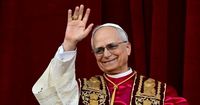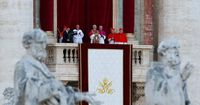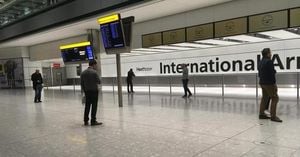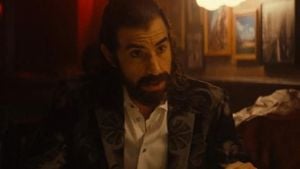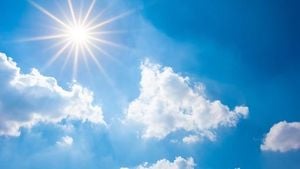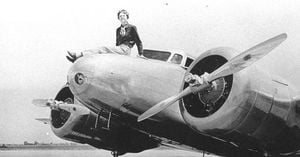The prayers of the faithful gathered Thursday at Chicago’s cathedral were answered around noon local time. “Habemus papam!” they heard from the live television broadcasts covering the results of the conclave in Rome. And that pope turned out to be Cardinal Robert Francis Prevost. Born in the great Midwestern city, he chose the name Leo XIV, becoming the first American in history to ascend to the Chair of Saint Peter.
Prevost, who served as bishop of Chiclayo in Peru—a country with which he has been connected for 40 years over two separate periods totaling two decades—ultimately emerged as the frontrunner in a race where he had been gaining momentum in recent days, though it was far from certain that the chosen one would come from this part of the world. Unlike most of his fellow countrymen, this Augustinian is multilingual and has spent much of his life outside the United States. His connection to Peru is so deep that he holds Peruvian citizenship.
After spending his childhood in the southern part of Chicago, one of the city’s most disadvantaged areas, he was ordained a priest in 1982 at the age of 27. He later earned a doctorate in canon law from the Pontifical University of St. Thomas Aquinas in Rome. In Peru—where he first arrived in the mid-1980s—he served as a missionary, parish priest, professor, and bishop. His work as a missionary was something his predecessor, Francis, particularly valued. He speaks both Spanish and Italian, as he demonstrated on Thursday during his first appearance as pope, when he chose not to speak in English.
Until Francis’ death, he held one of the most influential positions in the Vatican, where he was known as “the Latino Yankee”: since 2023, he had served as prefect of the Dicastery for Bishops. His appointment is seen as a continuation of his predecessor’s progressive spirit. He is expected to carry on some of Francis’ policies, though he does not share his open and extroverted personality. Those who know him point to his passion for tennis and describe him as a discreet and reserved man who felt the call to the priesthood under the influence of his father, Louis Marius Prevost, of French and Italian descent, who was a catechist. His mother, Mildred Martínez, was a librarian of Spanish heritage.
It is unclear whether he will be as open with gay, lesbian, bisexual, and transgender Catholics as Francis was. In a 2012 speech to bishops, he lamented that Western media and popular culture fostered “sympathy for beliefs and practices contrary to the Gospel,” according to The New York Times. He cited the “homosexual lifestyle” and “alternative families made up of same-sex couples and their adopted children.”
Prevost has also faced criticism for his handling of priests accused of sexual abuse, the great sin of the Church in the United States in recent decades. In 1999, he was elected provincial prior of the Augustinians of the Midwest. A year after assuming the position, he allowed a priest who had sexually abused minors to live in a rectory in Chicago, just half a block from a Catholic school. In 2022, he was accused in Chiclayo of failing to investigate abuse allegations against two priests. The diocese vehemently denied that accusation.
Upon hearing the news, U.S. President Donald Trump wrote on his platform Truth Social: “Congratulations to Cardinal Robert Francis Prevost, who was just named Pope. It is such an honor to realize that he is the first American Pope. What excitement and what a Great Honor for our Country. I look forward to meeting Pope Leo XIV. It will be a very meaningful moment!” Trump, who had clashed with him in the past, attended Francis’ funeral in Rome just a couple of weeks ago.
Catholicism is experiencing a surge in the United States to which this appointment will most likely contribute. Vice President J.D. Vance is a convert to Catholicism, and former president Joe Biden was the first president to profess that faith since John F. Kennedy. Catholic schools also saw an increase in enrollments during the pandemic. The rise of the Hispanic population in the United States has also played a role in this growth.
From his first moments on the balcony of St. Peter's Basilica, Pope Leo XIV gave three important clues about what kind of leader of the 1.4-billion-member Catholic Church he will be. Leo, formerly U.S. Cardinal Robert Prevost, was elected by the world's cardinals on Thursday as the new pope on the second day of the conclave to choose a successor to Pope Francis, who died last month. He is the first pope from the United States, but holds dual citizenship in Peru, where he was a missionary for decades before becoming a cardinal.
Leo's first clue was his choice of name. Popes often use this choice to send their first major signal about the priorities of their new papacy. Francis took his name from the 13th-century St. Francis of Assisi, who rejected wealth and wanted to care for the poor. The last pope to take the name Leo, Leo XIII, focused much of his 1878-1903 papacy on advocating for the rights of workers, calling for fair pay, fair working conditions, and the right to join unions. "By picking the name Leo XIV, he shows he is committed to the social teaching of the church," said Rev. Thomas Reese, a Jesuit commentator who follows the papacy closely.
Leo's second clue was his choice of language and the words he spoke, which put a clear emphasis on the need for peace, something Francis also often focused on. None of his speech to the crowds gathered in St. Peter's Square was in English, but rather Italian, the language of the papacy, and a brief foray into Spanish to greet his former community in Peru. He did not mention the U.S. "La pace sia con tutti voi!" (Peace be with you!), Leo's first words in public, echoed the ones Catholics use in their celebrations but also offered an immediate message of peace in a world riven with conflict.
The new pope said he wanted to share God's peace, calling it "a disarmed peace and a disarming peace" that is "humble and persevering." Leo also mentioned Francis, who offered his last blessing to crowds in Rome on Easter Sunday, the day before he died of a stroke after battling double pneumonia for weeks. "We still have in our ears that weak, but always courageous voice of Pope Francis," he said.
Leo's third clue was in his choice of attire. Unlike Francis, who spurned all the trappings of the papacy including on the first day he was elected in 2013, Leo wore a traditional red papal garment over his white cassock. Although Leo follows in the tradition of Francis, he signalled he is a new, and different, pope.
In his first words as Pope Francis’ successor, uttered from the loggia of St. Peter’s Basilica, Leo, 69, said, “Peace be with you,” and emphasized a message of peace, dialogue, and missionary evangelization. He wore the traditional red cape of the papacy—a cape that Francis had eschewed on his election in 2013. He spoke to the crowd in Italian and Spanish, but not English.
As the first American pope, Leo XIV's election has sparked a wave of excitement and pride across the United States, particularly in Chicago, where he was born. Bishop Larry Sullivan, vicar general of the Archdiocese of Chicago, expressed the excitement felt by many, stating, "I would say the Chicago way is that we come together, we share our faith." The cathedral’s rector, Father Gregory Sakowicz, noted that the sun came out in Chicago when the new pope was announced, a coincidence he described as "God’s way of remaining anonymous."
As Pope Leo XIV prepares to lead the Catholic Church, his first public Mass is set for Friday morning, May 9, 2025, at 11 a.m. in the Sistine Chapel. The world watches with anticipation as he embarks on this historic journey, carrying the hopes and prayers of millions.

